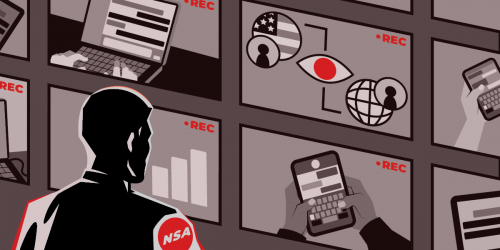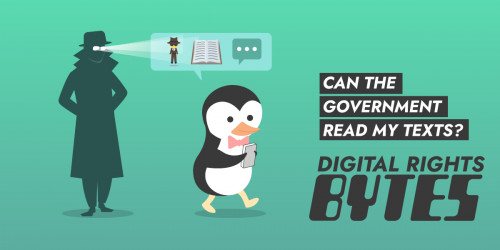We’ve filed our reply brief in the appeal of Smith v. Obama, our case challenging the NSA’s mass telephone records collection on behalf of Idaho nurse Anna Smith. The case will be argued before the Ninth Circuit Court of Appeal on December 8, 2014 in Seattle, and the public is welcome to attend.
Another case challenging the telephone records program, Klayman v. Obama, will be argued on November 4 in Washington DC before the DC Circuit and EFF will be participating as an amicus.
The Smith v. Obama case records are all here: but we thought we’d highlight three of the more outrageous arguments the government made, and our responses debunking them.
The Case
Mrs. Smith doesn’t think her phone records are any of the government’s business. That’s why, only a few days after the Guardian published a secret order from the Foreign Intelligence Surveillance Court revealing the government's bulk collection of the telephone records of millions of innocent Americans, she sued. Smith v. Obama challenges the government’s collection of call detail records under Section 215 of the PATRIOT Act. Mrs. Smith is represented by her husband, attorney Peter Smith, along with the ACLU, EFF, and Idaho State Rep. Luke Malek.
The district court said it felt bound to dismiss her claims because of a 1979 Supreme Court case, Smith v. Maryland. That case involved the collection of the phone numbers dialed by a criminal suspect over the course of three days. It’s one of the cornerstones of the so-called “third party doctrine,” the idea that people have no expectation of privacy in information they entrust to others—and it’s outdated to say the least.
The centerpiece of Mrs. Smith’s case is the issue of whether the government’s collection of our telephone records in bulk, and retention of those records for five years, triggers the Fourth Amendment's warrant requirement. The warrant requirement applies if there is a legitimate and reasonable expectation of privacy in those records. And if the warrant requirement applies, the collection is unconstitutional, since there is no warrant (everyone agrees that the secret FISA Court rulings allowing the bulk collection under Section 215 of the Patriot Act are NOT warrants).
We argue that there is a legitimate and reasonable expectation of privacy violated by the bulk collection of telephone records, because unlike the narrow situation the Supreme Court considered in 1979, they can reveal an incredible amount of sensitive information. For example, in one short-term study of only a few months of telephony metadata from 546 people, researchers at Stanford were able to identify one plausible inference of a subject obtaining an abortion; one subject with a heart condition; one with multiple sclerosis; and the owner of a specific brand of firearm.The government wants the court to simply ignore these differences. Alternately, the government argues that even if there is an expectation of privacy, it is so small compared to the government’s interest that the warrant requirement can be ignored, under something called the “special needs” test (more on that below).
But, as we emphasize in our reply brief, this is wrong, in part because we are living in what member of the President's Review Group Professor Peter Swire calls the “Golden Age of Surveillance.” As we argue: “technological advances have vastly augmented the government’s surveillance power and exposed much more personal information to government inspection and intrusive analysis. If courts ignored this reality, the essential privacy long preserved by the Fourth Amendment would be eliminated.”
The Government’s Arguments
So with that background, let’s look at three of the most troubling claims the government makes.
Call Detail Records Don’t Actually Identify People
The government still claims with a straight face that call detail records don't reveal private information, because they "do not include information about the identities of individuals," including “the name, address, [or] financial information” of any telephone subscribers.
That’s technically true, of course, but who cares? It’s not like this prevents the government from identifying you in less than a millisecond after it gets your telephone number. Last time we checked, the government did have access to, say, telephone books and the many public online services that can do reverse number lookup. That’s why we point out that: “phone numbers are every bit as identifying as names. Indeed, they are more so: while many people in the country may share the same name, no two phone subscribers share the same number.”
It’s pretty ridiculous for the government to continue to try to convince the court that the absence of the names in calling records represents any real privacy protection for the millions of Americans whose records are collected. It plainly does not.
We Have to Collect Everything for the Program to Work. But We’re Not Collecting Everything.
The government tries to challenge Mrs. Smith’s standing to sue by repeatedly alleging that the call detail records “program has never encompassed all, or even virtually all, call records and does not do so today.” It claims that the case should be dismissed because Mrs. Smith cannot immediately “prove” that her records were included. Of course, that’s not how litigation works. Mrs. Smith has good reason to believe that her records have been included—the government’s own public statements give her good reason. The district court properly rejected this argument, but the government continues to press it on appeal.
The government also seems to be talking out of both sides of its mouth here, since, as we note in our brief:“In explaining the program to Congress and the public…the government has emphasized not only that the program is comprehensive, but that this comprehensiveness is the key to its utility.”
In fact, Robert Litt, General Counsel of the Office of the Director of National Intelligence told Congress: “In order to find the needle that matched up against that number, we needed the haystack, right. That’s what the premise is in this case.” And NSA Deputy Director John Inglis defended the program by saying: “If you're looking for a needle in the haystack you need the haystack. So you wouldn't want to check a database that only has one third of the data, and say there’s a one third chance that I know about a terrorist plot, there’s a two thirds chance I missed it because I don’t have that data.”
So to get the case dismissed they want to convince the court that they aren't really collecting "virtually all" of the telephone records, but their public justifications rely on the fact that they are. So either they are collecting Mrs. Smith’s records, along with every other Verizon Wireless customer—Verizon is the second largest wireless service in the U.S. after all—or they are not very good at meeting their own stated goals. Which is it, government?
And that goes right to the heart of the government’s next argument:
Bulk Telephone Records Collection Isn’t Necessary to Protect Us—But Is Still Allowed Under the "Special-Needs Doctrine"
The government’s fallback argument is that even if the call detail records triggered the Fourth Amendment, a warrant is still not required under a narrow legal precedent called the “special-needs doctrine.” It allows warrantless searches of a few small categories of people who have a reduced privacy expectation, like students in schools or employees who handle dangerous equipment. It also only applies when compliance with probable-cause and warrant requirements would be “impracticable” and the government’s primary goals are not law enforcement.
The first problem here is that the millions of ordinary Americans affected by the government's bulk collection do not have a reduced expectation of privacy in the records of their telephone calls. The privacy interests here are great, since with a trail of telephone records, the government can learn extremely sensitive information.
The second problem is that no less than the White House itself has said that the government can accomplish its goals without bulk telephone records collection. This has been confirmed by the President’s two hand-picked panels as well as several Congressmembers who have seen the intelligence information. As we point out in our reply brief, the best the government can say about the program is that it “enhances and expedites” certain techniques it uses in its investigations. So getting a warrant isn’t impracticable, it’s just, at most, inconvenient. But as we point out: “If efficiency alone were determinative, the Fourth Amendment’s warrant requirement would have no force at all.”
The special-needs argument is especially concerning because if the courts were to accept it, the special-needs doctrine could become an exception that swallows the Fourth Amendment’s rule against general searches. It could, de facto, create a national security exception to the Constitutional rights enjoyed by ordinary, nonsuspect Americans, something the founders plainly did not do when they created this country in the midst of a national security crisis.
We expect an interesting argument on December 8.







